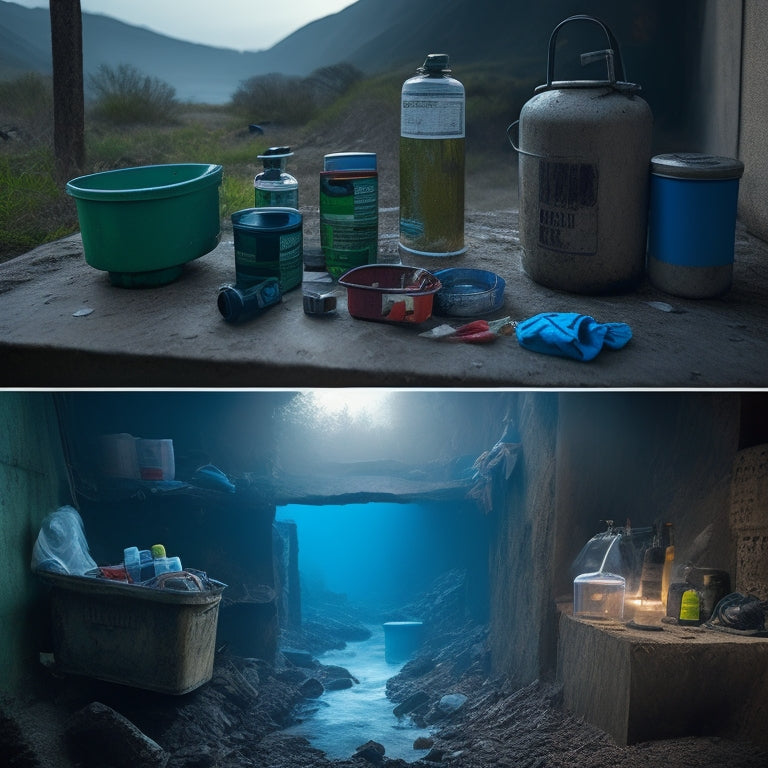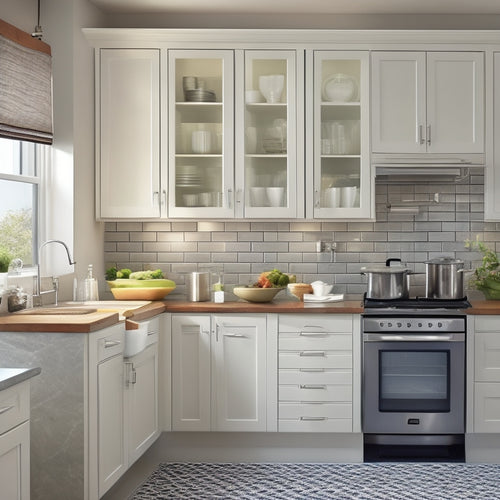
Sanitation Strategies for Survival: Expert Tips Included
Share
When facing a sudden crisis, you'll need effective sanitation strategies to stay healthy and safe. Establish a reliable toilet system, like a twin-bucket toilet, which is portable, easy to set up, and maintain. Prioritize hand hygiene by washing your hands frequently, using alternatives like hand sanitizer or baby wipes when water is scarce. Consider specialized equipment for individuals with disabilities, elderly, and children. Implement waste disposal strategies and establish regular maintenance schedules. Having access to essential resources like toilet systems, hand-washing stations, and waste disposal methods is vital. Now, take the next step to guarantee your survival.
Key Takeaways
• In emergency situations, prioritize a twin-bucket toilet system for efficient and hygienic waste management.
• Implement hand hygiene protocols, including frequent washing and sanitizing, to prevent disease spread.
• Consider the needs of vulnerable individuals, such as those with disabilities, elderly, and children, when planning sanitation systems.
• Identify suitable locations for toilet and hand-washing stations, considering factors like wind direction and water proximity.
• Stock up on essential resources, including toilet systems, hand-washing supplies, and waste disposal methods, to ensure effective sanitation.
Toilet Systems for Emergency Situations
When disaster strikes, a reliable toilet system becomes a lifeline, providing a safe and sanitary way to manage human waste, and a twin-bucket toilet system is a vital solution for emergency situations.
You'll want a system that's easy to set up, use, and maintain. A twin-bucket toilet system fits the bill, offering a hygienic and efficient way to handle waste.
This portable toilet system is ideal for emergency sanitation, as it's compact, lightweight, and easy to transport. With a twin-bucket system, you can rest assured that you'll have a safe and reliable way to manage human waste, even in the most challenging situations.
Hand Hygiene in Crisis Scenarios
While a reliable toilet system is essential, it's equally important to prioritize hand hygiene in crisis scenarios, as it's the first line of defense against the spread of diseases and infections. You should aim to wash your hands frequently, especially after using the toilet, before preparing food, and after handling waste.
In situations where water is scarce, consider the following alternatives:
-
Use soap alternatives like hand sanitizer or baby wipes to clean your hands.
-
Prioritize washing your hands with purified water, which can be achieved through methods like boiling, solar disinfection, or using water purification tablets.
-
If water is unavailable, use dry hand-washing methods like applying a small amount of hand sanitizer to your hands and rubbing them together until the sanitizer is fully absorbed.
Special Sanitation Considerations
Your sanitation plan should also address the unique needs of individuals with disabilities, elderly people, and young children, as they may require additional support or specialized equipment to maintain proper hygiene and waste disposal. You'll need to take into account accessibility challenges, such as wheelchair-accessible toilets and hand-washing stations.
Menstrual hygiene is another important aspect to take into account, ensuring that you have a plan for safe and private menstrual product disposal. Additionally, you may need to provide extra assistance or adaptive tools for individuals who require them.
Implementing Sanitation Systems
Now that you've considered the special sanitation needs of your household or community, it's time to set up the sanitation systems that will support them.
Implementing effective sanitation systems requires careful planning and attention to detail. Here are three key steps to get you started:
-
Sanitation Station Planning:
Identify a suitable location for your toilet and hand-washing stations, making sure they're accessible, private, and safe. Consider factors like wind direction, sunlight, and proximity to water sources. -
Waste Disposal Strategies:
Develop a plan for disposing of waste safely and hygienically. This may involve digging a pit latrine, using a septic system, or implementing a composting toilet. -
Maintenance and Upkeep:
Establish a regular maintenance schedule to guarantee your sanitation systems continue to function properly. This includes tasks like emptying waste containers, cleaning toilet surfaces, and replenishing hand-washing supplies.
Essential Resources and Tips
Setting up effective sanitation systems requires access to essential resources and tips that can make all the difference in maintaining hygiene and preventing the spread of diseases.
When it comes to emergency sanitation, having the right hygiene essentials can be a lifesaver. You'll need a reliable toilet system, hand-washing station, and proper waste disposal methods.
Consider investing in a twin-bucket toilet system, which is a cost-effective and efficient solution for emergency sanitation. Don't forget to stock up on hand-washing supplies, such as soap and water containers.
Frequently Asked Questions
Can I Use a Twin-Bucket Toilet System in a Small RV or Camper?
When venturing into the wild, you're not alone in wondering if a twin-bucket toilet system can fit in your small RV or camper. Fortunately, space efficiency is key in these systems, and with proper odor control, you can successfully implement one in your compact space.
How Often Should I Empty and Clean a Hand-Washing Station?
You should empty and clean your hand-washing station daily, or more often if soap residue builds up, to maintain water quality and prevent bacterial growth, ensuring a safe and hygienic washing experience.
Are There Any Alternative Sanitation Methods for Areas With High Water Tables?
You'll find that mound systems, which involve elevated toilets and evapotranspiration, are effective alternative sanitation methods for areas with high water tables, as they reduce groundwater contamination risks and promote efficient wastewater treatment.
What Are the Most Critical Sanitation Considerations for Families With Pets?
When planning sanitation for your family with pets, you'll want to contemplate pet waste management, seeking veterinary guidance on safe disposal methods to prevent disease transmission and maintain a clean environment for your loved ones.
Can I Use Gray Water for Flushing a Twin-Bucket Toilet System?
As you ponder the prospect of using gray water for flushing, imagine a delicate balance: you're walking a tightrope between water conservation and soil saturation. Yes, you can use gray water, but guarantee proper treatment and maintenance to avoid contamination and health risks.
Related Posts
-

Revolutionize Your Kitchen With Clever Organizers
I've streamlined my kitchen by incorporating clever organizers that have transformed the way I cook and live. By maxi...
-

Boost Kitchen Cabinet Storage With Lid Racks
You're looking to boost your kitchen cabinet storage with lid racks. By incorporating lid racks, you'll free up valua...

